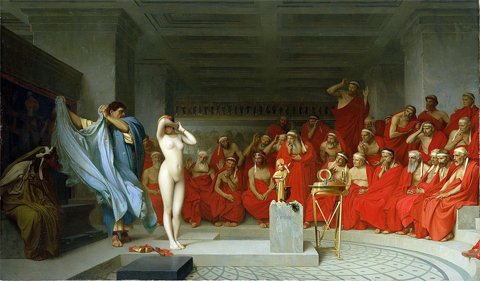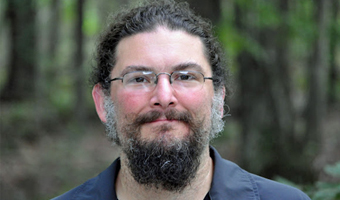
Phryne before the Areopagus by Jean-Léon Gérôme: A depiction of Phryne, a famous hetaera (courtesan) of Ancient Greece, being disrobed before the Areopagus. Phryne was on trial for profaning the Eleusinian Mysteries, and is said to have been disrobed by Hypereides, who was defending her, when it appeared the verdict would be unfavourable. The sight of her nude body apparently so moved the judges that they acquitted her. Some authorities claim that this story is a later invention.
The Knowing the Future theme presents Dr. Joshua Sosin on “Slaves, Aliens, Freedmen, and Citizens: Ancient Athenian Legal Status” on Thursday, March 10, at 6 p.m. in Porter 105.
A reception and refreshments follow the lecture.
 Sosin is Associate Professor of Classical Studies at Duke University. This event also is sponsored by the departments of History and Classics & World Religions.
Sosin is Associate Professor of Classical Studies at Duke University. This event also is sponsored by the departments of History and Classics & World Religions.
About Josh Sosin
“My current scholarship bulks in two main areas. The first is what you might call Digital Classics. Under a joint appointment in the Duke University Libraries, I direct the Duke Collaboratory for Classics Computing (DC3). We specialize in the creation of tools and services that serve critical infrastructure needs for Classics and beyond. We maintain papyri.info. We are working on a variety of projects to do with crowd-curation of papyrological and epigraphic texts (text, translation, metadata, commentary, bibliography, and images), geo-spatial data, prosopographical information, medieval manuscript witnesses and apparatus criticus data, image recognition and text-image alignment, and more,” according to his webpage.
“The other, more ‘traditional’ half of my scholarship lies at what I like to call the intersection of law, economics, and religion. Under that broad rubric I have written on currency standards and exchange, ancient charitable foundations, funding of eponymous festivals, grain supply, land leasing, taxation and tax shelter, diplomacy, and other subjects. I have long tended to pursue these subjects with a special focus on their representation in documentary sources (inscriptions, papyri, and coins). But lately, I’ve grown increasingly interested in Athenian law and so not only to the orators but also to the lexicographic, encyclopedic, and scholiastic traditions that preserve such a wealth of information on the subject. I have been especially drawn to what the law has to say about personal status (citizens, slaves, freedmen, metics, aliens).”



















Comments